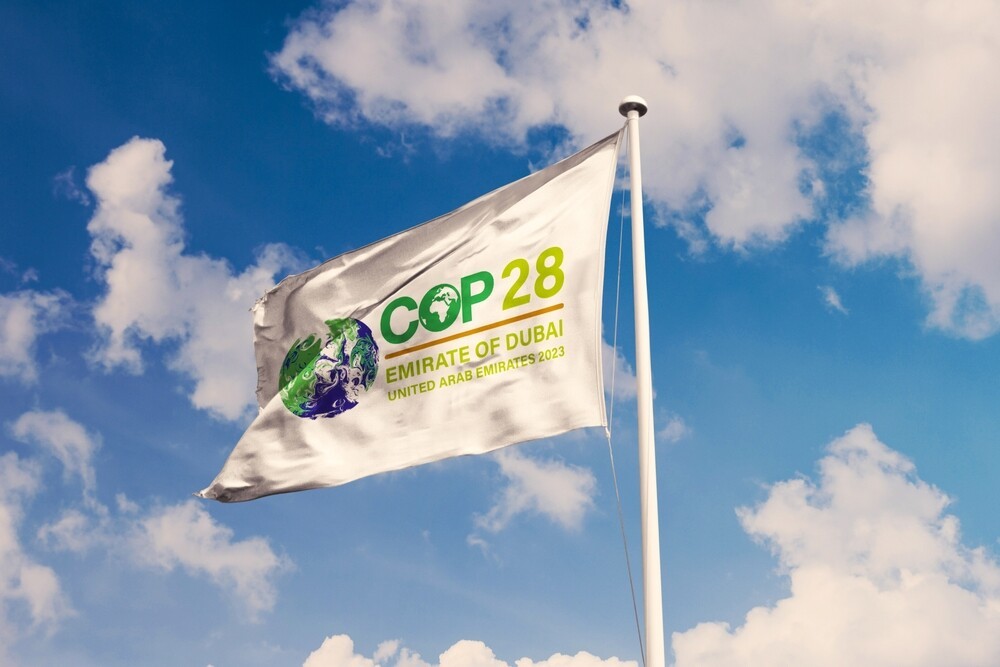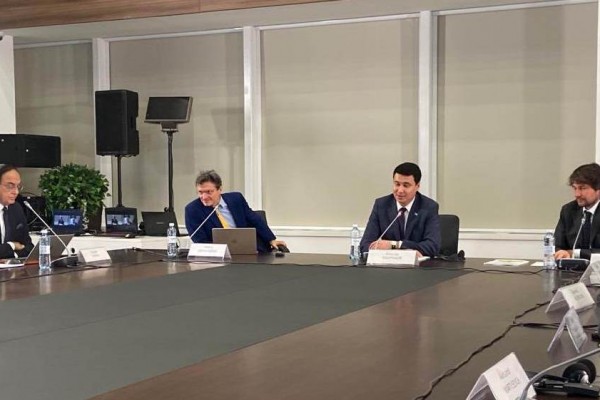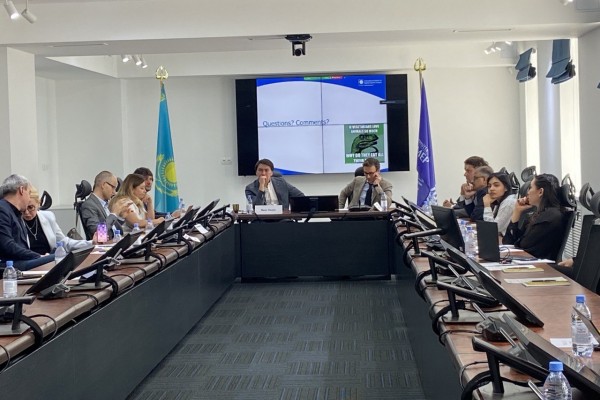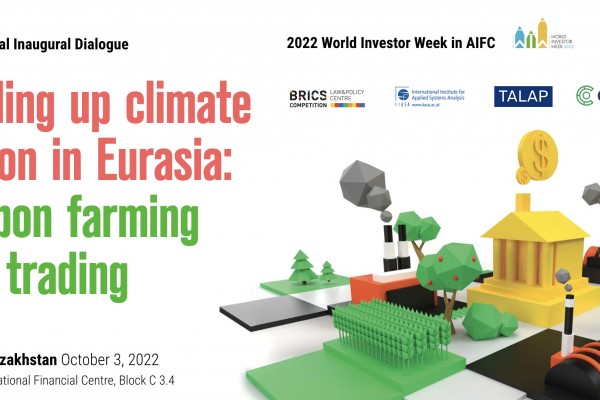On December 10, the International BRICS Competition Law and Policy Centre together with the International Institute for Applied Systems Analysis (IIASA) presented the report entitled "Carbon farming in Kazakhstan: unlocking opportunities" in the framework of the 28th Conference of the Parties to the UN Framework Convention on Climate Change in Dubai (UAE).
Opening the meeting, Alexey Ivanov, Director of the BRICS Competition Law and Policy Centre, noted the prospect of developing carbon credit markets that can be based on natural solutions and biological forms of carbon sequestration. The countries of the Eurasian region, primarily Kazakhstan, Russia, Mongolia, and India, have great potential for the development of carbon farming projects. Such projects, among other things, can be of great help in combating desertification, which affects most of the countries in the so-called Asian Dryland Belt, Ivanov emphasized.
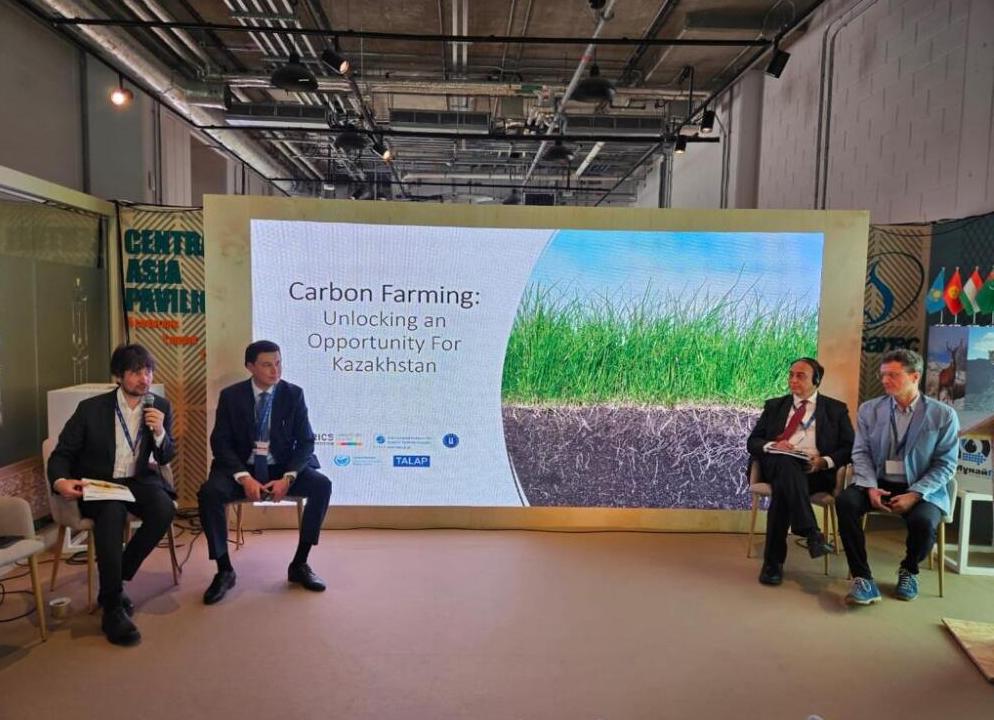
Kazakhstan highly appreciates the potential of carbon farming projects and their role in the implementation of the Carbon Neutrality Strategy until 2060 adopted by President Tokayev, said Mansur Oshurbayev, Vice Minister of the Ecology and Natural Resources of the Republic of Kazakhstan. More details on the prospects for the development of carbon farming in Kazakhstan and in the Eurasian space were given by the keynote speaker — Michael Obersteiner, Director of the Environmental Change Institute, University of Oxford and Senior Research Fellow at the International Institute for Applied Systems Analysis (IIASA).
With a total area of Kazakhstan of more than 272 million hectares, about 57 million hectares are degraded soils (soils with deteriorated properties and reduced fertility), which have a significant sequestration potential that can exceed the similar potential of forest ecosystems. The application of carbon farming technologies will either increase sequestration of carbon from the atmosphere by soils and plant biomass or reduce greenhouse gas emissions. However, today sustainable land management practices are currently applied on as little as 1% of agricultural lands in Kazakhstan, and its land use sector remains a net source of emissions rather than a net sink, said Michael Obersteiner. Appropriate mechanisms are needed to stimulate the implementation of carbon farming methods on these lands.
"I think the carbon farming project in Kazakhstan will be of great benefit as an example for the whole region and the Asian Dryland Belt. This knowledge and experience can be used to scale up similar practices or even larger integrated projects."
Carbon farming programs can bring not only climatic but also significant environmental and socio-economic benefits, emphasized Pradeep Monga, former Deputy Executive Secretary of the United Nations Convention to Combat Desertification (UNCCD). Such projects contribute to the achievement of the UN Sustainable Development Goals, create additional jobs, improve the efficiency and sustainability of agricultural production and across the value chains of which participating famers are a part. Sustainable land management practices have been estimated to create up to 2 jobs per each 5 hectares of land on which they are implemented and to contribute to reducing the economic gap between urban and rural areas.
"The introduction of carbon farming programs will serve as a perfect example of bringing together the public and private sector, as well as local communities. This will provide multiple benefits, including the global benefit of making land use a sector of carbon sink rather than a source of emissions."
Given the current trends of rising global temperatures and increasing precipitation, it can be assumed that until the middle of this century, 2050s, a narrow window most favorable for ecosystem restoration and the development of carbon farming in Kazakhstan will be available, said Xiaoxia Jiam, Programme Officer on Science and Interim Regional Coordinator for Asia and Pacific of UNCCD. The Eurasian region can contribute to climate change mitigation with integrated sustainable land use planning aimed at neutralizing land degradation, the expert pointed out.
During the meeting, the issue of farmers' ownership rights to land suitable for the carbon farming programs was also raised. The existing model of renting or leasing land from the state in Kazakhstan requires adjustment of legislation, as it provides for the use of land only for agricultural or industrial activities.
Financial infrastructure for carbon trading is ready to provide farmers with the Astana International Financial Centre (AIFC), stressed Alexey Ivanov. In addition, he believes that it is necessary to introduce a mechanism of at least minimal price regulation to balance the opportunities for transactions between suppliers of carbon credits and potential buyers, which are more consolidated and have more leverage.
Building global markets for carbon units is mandated by Article 6 of the 2015 Paris Climate Agreement, but little progress has been made, discouraging those looking to invest in carbon climate projects, Ivanov noted.
"If civil society, investors and farmers collectively lobbied for a solution to this problem, it would be of great benefit. In case at the 30th UN Conference on Climate Change, which will be held in 2025 in Brazil, we could agree on the development of international or at least regional carbon markets within the framework of BRICS cooperation, this would be a big step forward,"
said the Director of the BRICS Competition Centre.
28th Conference of the Parties to the UN Framework Convention on Climate Change (COP28) opened in Dubai on November 30. More than 70,000 delegates from different countries, including heads of state, representatives of big business and non-governmental organizations, as well as researchers, scientists and civil society representatives are expected to attend the conference, which will run until December 12. The summit is seen as an opportunity for countries to better control climate change through the development of joint goals and through various instruments, including climate finance.
Photo Credit: HSE University
